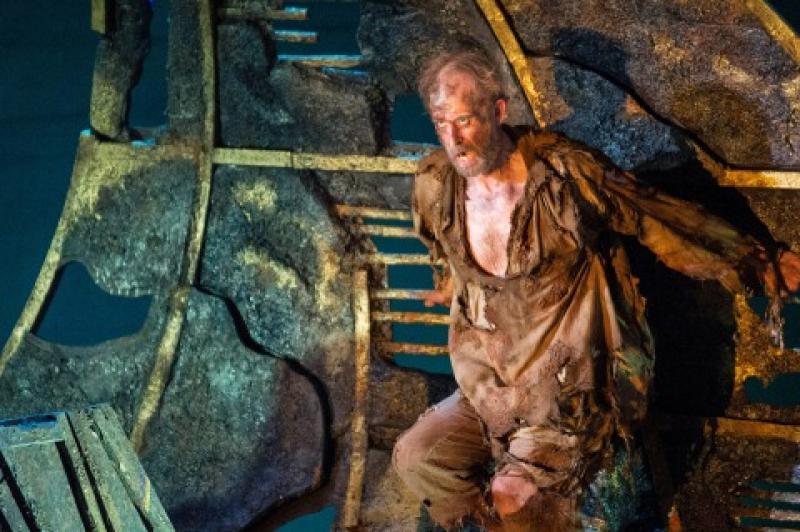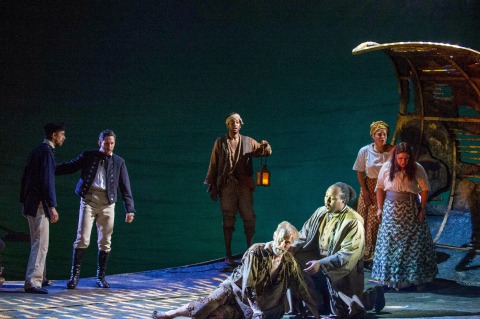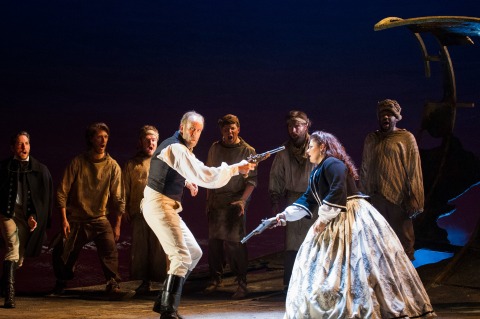The Wild Man of the West Indies, ETO, Hackney Empire | reviews, news & interviews
The Wild Man of the West Indies, ETO, Hackney Empire
The Wild Man of the West Indies, ETO, Hackney Empire
Far from wild, this show is far too tame for real operatic drama

“Do you think they’ve got enough plot to get us through to the end?” I overheard a lady anxiously asking her husband during the interval. It was a fair question. Donizetti’s The Wild Man of the West Indies was written within a year of L’elisir d’amore, and the two operas share many things, but not that spark of genius that can transform a pantomime into a drama. Rarely has so little happened in an opera, and with even less effect.
Which makes it all the more baffling that the imaginative and usually so reliable English Touring Opera would tackle it. General director James Conway is quoted in the programme as saying he only chooses works he thinks the company “have a good chance of doing very well”. I’d argue that here the dice were thrown long before the company even started work on this production – the first, incidentally, in the UK in living memory.
Most of the action has already happened by the time the opera starts
Derived from Cervantes’ Don Quixote, the story is simple enough, involving a Spanish nobleman turned mad through jealous rage, his philandering brother and his estranged wife, who all end up, in varying states of volition and undress, on the island of San Domingo. Here they abuse and bully the native population, while fighting, reconciling and narrowly avoiding a suicide pact.
The trouble is that most of the action has already happened by the time the opera starts, so – with the exception of the Act II reunion scene between the mad Cardenio (Craig Smith) and Eleonora (Sally Smith) – most of the stage-business only serves to narrate the backstory. Which leaves the singers and chorus desperately searching for anything approximating function or intent, all the while trying hard not to be racist in this slavery-centric context. It’s all rather awkward.
 Although Florence de Mare’s lovely set – rearing up at the back, part wave, part ship – and Mark Howland’s evocative lighting give the action every chance, director Iqbal Khan can’t seem to make the scene work. Time and again on the Hackney Empire’s compact stage, characters barely a metre apart spend lengthy episodes “not noticing” one another or colliding for comic effect. Perhaps if the score were stronger or more certain of itself none of this would matter, but this is Donizetti by the yard. And with the exception of Fernando’s Act II aria (nicely sung by Nicholas Sharratt) the music barely troubles itself with the mood or the emotion of the action underway.
Although Florence de Mare’s lovely set – rearing up at the back, part wave, part ship – and Mark Howland’s evocative lighting give the action every chance, director Iqbal Khan can’t seem to make the scene work. Time and again on the Hackney Empire’s compact stage, characters barely a metre apart spend lengthy episodes “not noticing” one another or colliding for comic effect. Perhaps if the score were stronger or more certain of itself none of this would matter, but this is Donizetti by the yard. And with the exception of Fernando’s Act II aria (nicely sung by Nicholas Sharratt) the music barely troubles itself with the mood or the emotion of the action underway.
Conway speaks passionately about the opera’s psychology, and there’s no faulting the potential of a story that plays games with sanity and madness and chooses an elderly, complicated bass for its hero rather than a glossy young tenor. Unfortunately Donizetti makes little of his material, and there’s nothing that comes even close to equalling the mad scene of Lucia or the emotional truthfulness of L’elisir.
 Smith (pictured left with Silver) delivers a fine performance loaded with character and inner life. His carefully judged understatement and Peter Braithwaite’s busy naturalism (as the put-upon Kaidama) contrast with Silver’s dramatic histrionics. Both she and Sharratt struggle to relax at the top of their voices, leading to some rather wayward musical climaxes. Conductor Jeremy Silver opts for sturdy tempos that could occasionally do with throwing caution to the wind.
Smith (pictured left with Silver) delivers a fine performance loaded with character and inner life. His carefully judged understatement and Peter Braithwaite’s busy naturalism (as the put-upon Kaidama) contrast with Silver’s dramatic histrionics. Both she and Sharratt struggle to relax at the top of their voices, leading to some rather wayward musical climaxes. Conductor Jeremy Silver opts for sturdy tempos that could occasionally do with throwing caution to the wind.
With determined work from the male chorus and plenty of energy from the cast, ETO just about get away with this show. But I for one won’t be heading back to San Domingo any time soon.
- English Touring Opera perform The Wild Man of the West Indies at venues across the UK until 27 May
rating
Explore topics
Share this article
Add comment
The future of Arts Journalism
You can stop theartsdesk.com closing!
We urgently need financing to survive. Our fundraising drive has thus far raised £49,000 but we need to reach £100,000 or we will be forced to close. Please contribute here: https://gofund.me/c3f6033d
And if you can forward this information to anyone who might assist, we’d be grateful.

Subscribe to theartsdesk.com
Thank you for continuing to read our work on theartsdesk.com. For unlimited access to every article in its entirety, including our archive of more than 15,000 pieces, we're asking for £5 per month or £40 per year. We feel it's a very good deal, and hope you do too.
To take a subscription now simply click here.
And if you're looking for that extra gift for a friend or family member, why not treat them to a theartsdesk.com gift subscription?
more Opera
 La bohème, Opera North review - still young at 32
Love and separation, ecstasy and heartbreak, in masterfully updated Puccini
La bohème, Opera North review - still young at 32
Love and separation, ecstasy and heartbreak, in masterfully updated Puccini
 Albert Herring, English National Opera review - a great comedy with depths fully realised
Britten’s delight was never made for the Coliseum, but it works on its first outing there
Albert Herring, English National Opera review - a great comedy with depths fully realised
Britten’s delight was never made for the Coliseum, but it works on its first outing there
 Carmen, English National Opera review - not quite dangerous
Hopes for Niamh O’Sullivan only partly fulfilled, though much good singing throughout
Carmen, English National Opera review - not quite dangerous
Hopes for Niamh O’Sullivan only partly fulfilled, though much good singing throughout
 Giustino, Linbury Theatre review - a stylish account of a slight opera
Gods, mortals and monsters do battle in Handel's charming drama
Giustino, Linbury Theatre review - a stylish account of a slight opera
Gods, mortals and monsters do battle in Handel's charming drama
 Susanna, Opera North review - hybrid staging of a Handel oratorio
Dance and signing complement outstanding singing in a story of virtue rewarded
Susanna, Opera North review - hybrid staging of a Handel oratorio
Dance and signing complement outstanding singing in a story of virtue rewarded
 Ariodante, Opéra Garnier, Paris review - a blast of Baroque beauty
A near-perfect night at the opera
Ariodante, Opéra Garnier, Paris review - a blast of Baroque beauty
A near-perfect night at the opera
 Cinderella/La Cenerentola, English National Opera review - the truth behind the tinsel
Appealing performances cut through hyperactive stagecraft
Cinderella/La Cenerentola, English National Opera review - the truth behind the tinsel
Appealing performances cut through hyperactive stagecraft
 Tosca, Royal Opera review - Ailyn Pérez steps in as the most vivid of divas
Jakub Hrůša’s multicoloured Puccini last night found a soprano to match
Tosca, Royal Opera review - Ailyn Pérez steps in as the most vivid of divas
Jakub Hrůša’s multicoloured Puccini last night found a soprano to match
 Tosca, Welsh National Opera review - a great company reduced to brilliance
The old warhorse made special by the basics
Tosca, Welsh National Opera review - a great company reduced to brilliance
The old warhorse made special by the basics
 BBC Proms: The Marriage of Figaro, Glyndebourne Festival review - merriment and menace
Strong Proms transfer for a robust and affecting show
BBC Proms: The Marriage of Figaro, Glyndebourne Festival review - merriment and menace
Strong Proms transfer for a robust and affecting show
 BBC Proms: Suor Angelica, LSO, Pappano review - earthly passion, heavenly grief
A Sister to remember blesses Puccini's convent tragedy
BBC Proms: Suor Angelica, LSO, Pappano review - earthly passion, heavenly grief
A Sister to remember blesses Puccini's convent tragedy
 Orpheus and Eurydice, Opera Queensland/SCO, Edinburgh International Festival 2025 review - dazzling, but distracting
Eye-popping acrobatics don’t always assist in Gluck’s quest for operatic truth
Orpheus and Eurydice, Opera Queensland/SCO, Edinburgh International Festival 2025 review - dazzling, but distracting
Eye-popping acrobatics don’t always assist in Gluck’s quest for operatic truth

Comments
The fine singing of most of